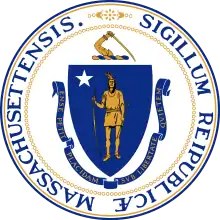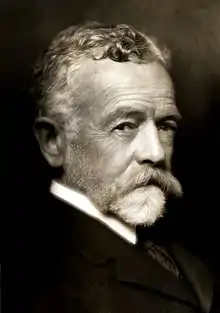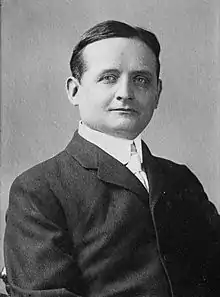1916 United States Senate election in Massachusetts
The 1916 United States Senate election in Massachusetts was held on November 7, 1916. Republican incumbent Henry Cabot Lodge defeated Democratic Mayor of Boston John F. Fitzgerald to win election to a fifth term.
| |||||||||||||||||
| |||||||||||||||||
| |||||||||||||||||
| Elections in Massachusetts |
|---|
 |
This was the first United States Senate election in Massachusetts decided by popular vote, as required by the Seventeenth Amendment to the United States Constitution.
Republican primary
Declared
- Henry Cabot Lodge, incumbent Senator
Results
| Party | Candidate | Votes | % | |
|---|---|---|---|---|
| Republican | Henry Cabot Lodge (incumbent) | 104,118 | 100.00% | |
| Write-in | All others | 2 | 0.00% | |
| Total votes | 104,120 | 100.00% | ||
Democratic primary
Declared
- John F. Fitzgerald, former Mayor of Boston and U.S. Representative (grandfather of future President John F. Kennedy)
Results
| Party | Candidate | Votes | % | |
|---|---|---|---|---|
| Democratic | John F. Fitzgerald | 64,551 | 100.00% | |
| Write-in | All others | 2 | 0.00% | |
| Total votes | 64,553 | 100.00% | ||
General election
Candidates
- John F. Fitzgerald, former Mayor of Boston and U.S. Representative (Democratic)
- Henry Cabot Lodge, incumbent U.S. Senator since 1893
- William N. McDonald (Socialist)
Campaign
Fitzgerald attacked Lodge for his opposition to the direct election of Senators and the Federal Employees' Compensation Act. He declared that "[Lodge's] career shows a singular lack of touch with the people... it is for private interests that he has stood during his career."[3]
Lodge also faced criticism over his charge of weakness against President Wilson's response to the sinking of the RMS Lusitania. Lodge was forced to withdraw his charge.[3]
Results
| Party | Candidate | Votes | % | |
|---|---|---|---|---|
| Republican | Henry Cabot Lodge (incumbent) | 267,177 | 51.68% | |
| Democratic | John F. Fitzgerald | 234,238 | 45.31% | |
| Socialist | William N. McDonald | 15,558 | 3.01% | |
| Write-in | All others | 26 | 0.00% | |
| Total votes | 516,999 | 100.00% | ||
Aftermath
In 1952, Fitzgerald's grandson John F. Kennedy defeated Lodge's grandson Henry Cabot Lodge Jr. to win election to this same Senate seat. Fitzgerald's daughter Rose Fitzgerald Kennedy would say that her son John had "evened the score" with the Lodges and avenged her father's defeat. A final contest between the two families came in 1962, when Ted Kennedy defeated George C. Lodge for the same seat.[5]
References
- Office of the Secretary of Commonwealth of Massachusetts (1916). Number of assessed polls, registered voters and persons who voted in each voting precinct in the Commonwealth of Massachusetts at the state, city and town elections. pp. 125.
- Office of the Secretary of Commonwealth of Massachusetts (1916). Number of assessed polls, registered voters and persons who voted in each voting precinct in the Commonwealth of Massachusetts at the state, city and town elections. pp. 252.
- Whalen 2000, p. 5.
- Office of the Secretary of Commonwealth of Massachusetts (1916). Number of assessed polls, registered voters and persons who voted in each voting precinct in the Commonwealth of Massachusetts at the state, city and town elections. p. 558.
- Whalen 2000, p. 6.
Bibliography
- Whalen, Thomas J. (2000). Kennedy versus Lodge: The 1952 Massachusetts Senate race. Boston, Mass.: Northeastern University Press.

